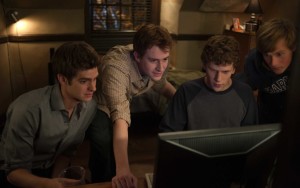Directed by David Fincher, and produced by Kevin Spacey, “The Social Network” is the real life story of Harvard undergrad Mark Zuckerberg’s creation of the goliath website Facebook, and his quick rise to becoming the world’s youngest billionaire. Jesse Eisenberg stars as Zuckerberg, a role that earned him an Academy Award nomination for “Best Actor,” and he portrays the role of the unlikeable and socially inept computer nerd like he was born for the part.
Set in Cambridge, Massachusetts in the early part of the decade, “The Social Network” is told through two simultaneous flashbacks: Zuckerberg is the defendant in a pair of lawsuits, one brought about by Harvard classmates the Winklevoss twins (played with a perfect amount of comic zing by Armie Hammer) who are claiming he stole the idea for Facebook from them, and the other by his best (and only) friend Eduardo Saverin (Andrew Garfield), who backed Facebook financially at the start before gradual and relatively painful falling out with Zuckerberg.
Through informal trial depositions we learn the story of how the web site was founded in a college dorm room and almost immediately grew to worldwide fame and success, as told through the perception of the litigants, with the actual parties being the only ones who know for certain what really happened.

The most interesting dynamic of “The Social Network” is the inevitable conflict the viewer has in choosing a side to root for from a host of unlikeable characters: the independently wealthy alpha-male Olympic rowing Winklevoss twins, former friend Eduardo who funds the site by writing checks from his father’s limitless bank account, the underhanded Napster-creating miscreant Sean Parker (Justin Timberlake) or Zuckerberg himself who, while seemingly well-intentioned, is an uncouth and obnoxious jerk.
By the end you’ll come to the sad realization that none of the plaintiffs actually needs the money for which they are seeking from Zuckerberg. Rather they all want the fame that goes along with being the website’s creator. At one point Zuckerberg says of the twins that “they’re suing me because for the first time in their lives things didn’t go exactly the way they were supposed to for them.”
Overall, the Social Network is an intriguing film that is well paced and will keep you interested. The seriousness of a hundred-million dollar lawsuit is intertwined with perfect amounts of humor and wit. Once you’ve watched it and had a chance to digest, think about the historical impact the film will have as it describes the creation of a monumental social website which brought about the first generation of people who were raised on the internet.
– by Matt Christopher
2 Comments
Pingback: » Trouble with the Curve (PG-13)
Pingback: » A Few Good Men (R)